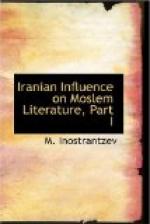I compared the well with the world which is brimful of all manner of harm and terrible perils, the four snakes with the four humours which constitute the physical basis of man, but which, should they be excited, prove mortal poison; the branches to life, the black and white mice to night and day which in perpetual alternation consume our lifetime; the dragon with death inevitable; the honey to the particle of joy which man derives from his senses of smell, taste, sight, hearing and feeling, but which makes him oblivious of himself and all his circumstances and decoy away from the path to emancipation. So circumstanced I found myself, and endeavoured to conduct myself with as much rectitude as possible in the hope once again to experience a time when I should acquire a guide for myself and help for my cause. I remained in this stage till I returned from India to my homeland after I had made a copy of this book and a few more.
APPENDIX IV
THE TRIAL OF AFSHIN..
A DISGUISED ZOROASTRIAN GENERAL.
[Afshin was a Zoroastrian at heart. His trial and condemnation are referred to by Browne, Literary History of Persia. I take the account direct from Tabari. It is to be found also in Ibn Athir and Ibn Khaldun. The legal procedure reveals prominently the condition under which professed non-Moslems lived—religious liberty was granted to them. Note that it was possible to chastise ecclesiastical officers like Imams and Muezzins because of their interference with the religious practices of non-Moslems. Observe the part played by a Mobed at a criminal trial conducted according to Muhammadan usages. The Zoroastrian priest, who subsequently embraced Islam, comes forward to give evidence against the most puissant but covert co-religionist of his times.]
It has been related by Harun son of Isa, son of Mansur as follows:—I was present in the house of Muatisim and there were there Ahmad bin Ali Dawud and Ishaq bin Ibrahim son of Masab and Muhammad bin Abdal Maliq al Zayyad. They then brought Afshin who was yet not in rigorous imprisonment, and there were present people who were prepared to cause Afshin to shed tears. There was nobody in the house belonging to any high position except the sons of Mansur, for, the people had left. Those present were Muhammad bin Abdal Maliq al Zayyad and there were Mazyar, the ruler of Tabaristan, the Mobed, and the Marzban son of Urkesh, one of the chieftains of Sughd, and two people from among the Sughdians. Then Muhammad Ibn Abdal Maliq called the two people whose clothes were torn and asked them how they were. They then uncovered their backs which were torn of the flesh. Muhammad turning to Afshin asked “Do you know these?” “Yes, this man is the Mauzzin and this, one is the Imam who made a mosque at Ashrushana, and I struck each of them a thousand lashes, and that was because there was a covenant between myself and the kings of Sughd including a clause to the effect that I should leave each community to its own religion. But these two people attacked a shrine which had images in it, a shrine which was at Ashrushna, and they took out the images and turned the shrine into a mosque. I therefore struck them one thousand lashes for this transgression of theirs.”




